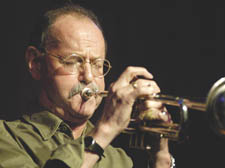|
|
 |
| |
| |

Ian Carr: the late Jazz trumpeter who launched Nucleus Revisited |
Flashback to Things Past
REVIEW: NUCLEUS REVISITED
Ronnie Scott's
JUST why the music of the late jazz trumpeter Ian Carr should remain as popular as ever – particularly with the DJ mixer crowd – quickly became apparent at a performance of the Nucleus Revisited band at Ronnie Scott’s.
The band’s members are the same as those of the last performances of Nucleus in 2005 when Carr was still playing with the band which was originally formed by him and launched at Ronnie Scott’s as long ago as 1969.
On the trumpet, Chris Batchelor took Carr’s place having rehearsed with Carr himself for the 2005 sessions and was able to provide a real flavour of the master’s trumpeting.
Selections by Nucleus Revisited from Carr’s compositions over the long period of years demonstrated the key aspects of his musical approach.
In essence, a strong rhythmic pulse driven by a bass guitar provides the structural underpinnings for the melody and improvisation by the soloists.
The selections came from several of Carr’s seminal albums: Awakening, Out of the Long Dark and Things Past.
A particular highlight was the highly popular Roots number dating from 1973 that has been picked up by the DJ crowd to provide the rhythmic backdrop for rappers and others.
Geoff Castle, keyboardist of Nucleus Revisited and a member of Nucleus in the 1970s, related how the band’s rhythmic numbers gained a worldwide reputation, in particular The Rights of Man, first performed in 1974.
When the number was played at a festival concert in Delhi, the audience of thousands sang along with the famous “rum-baa-baa-rum” rhythm.
Although the Ronnie Scott’s crowd failed to sing along, you could see why it became such a popular piece.
Also playing on either side of Nucleus Revisited was the Michael Garrick Quartet, the reason being that pianist Garrick played with the Don Rendell-Ian Carr band at Ronnie Scott’s and elsewhere in the 1960s.
Garrick finished his set with Carr’s awesome Dusk Fire, written after he heard John Coltrane’s Giant Steps for the first time.
With Garrick’s son Gabriel taking Carr’s place on the trumpet, Dusk Fire sounded as vital, fresh and thrilling today as it must have sounded on its first performance at Ronnie Scott’s all those years ago.
|
 |
|
|
 |
|
|
 |
|








